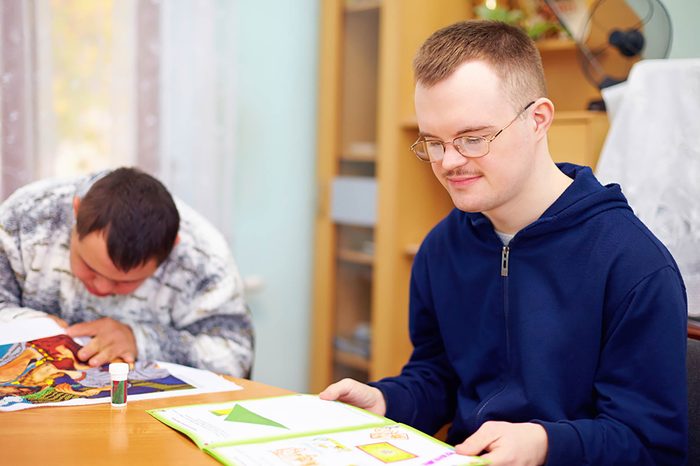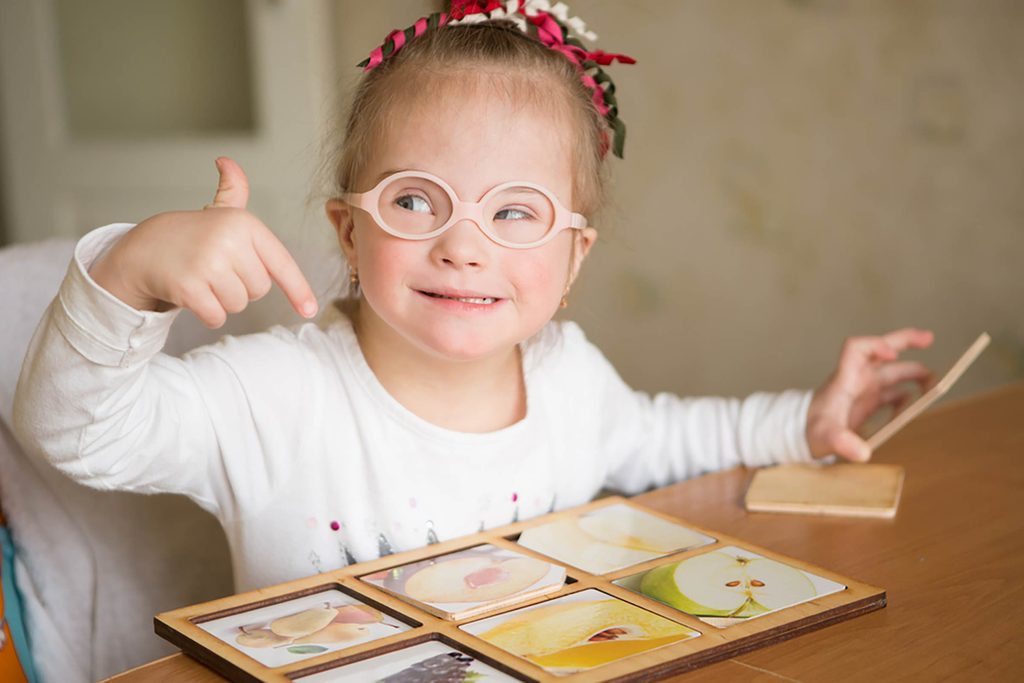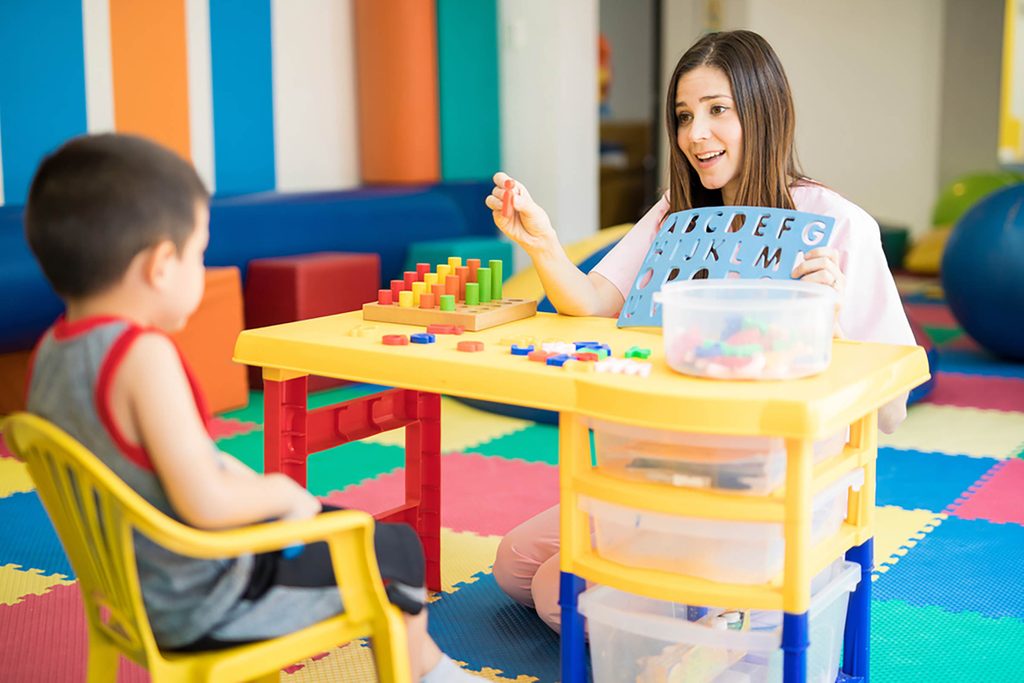
Even if your intentions are good
You may mean well when you attempt to compliment a parent of a special needs child, but any assumptions you make could potentially be hurtful. Avoid coming across as insulting or rude and make sure your sentiments convey what you really mean with this advice from parents and professionals.

“It’s amazing how smart he is.”
It seems commonplace for others to assume that children with special needs automatically have a difficult time learning. Claire Campbell, a mom of two deaf children who wear cochlear implants, says that this comment is one of the ones she hears most in different forms, such as “Doing well for a deaf kid—we feel so disappointed when we hear that from teachers.” Christina Low Kapalu, PhD and licensed psychologist at Children’s Mercy Kansas City Division of Developmental and Behavioral Sciences, says that people tend to place their own limitations on children with special needs that can have devastating psychological effects on both the child and the child’s parents. It’s important never to assume that a child’s disability limits his or her intelligence. Instead, you can ask a question like, “Is she enjoying school? What is her favorite subject?”, which can leave a more open-ended response for parents. These tips can also help you become more sensitive to the feelings of others.

“I am so sorry.”
It’s common for people not to know what to say to parents of children with special needs, and a quick response may be, “I’m sorry,” as if a child’s disability is a negative thing for the child or his parents. Noelle LaCharite, mom of Max, who was born with Down syndrome, says that seemingly harmless comment was one that she found the most irritating. “I would instantly go into Mama bear protective mode,” LaCharite says. Her standard response is, “There’s nothing to be sorry about. Max is amazing!” Dr. Kapalu says that it’s important never to pity a parent or child or their situation. Instead, she says to “ask questions that help you understand what it is like for them.” This shows both your compassion and interest in their situation.

“Stop spoiling her.”
Dr. Kapalu has heard several stories from parents of children with special needs about hurtful comments they’ve received from family and friends who tend to blame the parents for their child’s behaviors. Some special needs, like ADHD or autism, can be more invisible than others, as in they aren’t detectable just by looking at someone. Unfortunately, parents of these children often receive judgment regarding their children’s behaviors. “Small comments such as ‘they can control that right,’ ‘the kid just needs to try harder’, or ‘they are like that because you are too easy on them’ are not only infuriating but also very painful to most parents. These types of comments come from a place of judgment and serve to belittle a parent of a child with special needs,” says Dr. Kapalu. Instead of judgmental comments, outsiders can offer a helping hand to show their support for both the child and his parents. These impulse and control issues are common in kids with ADHD, but you may be able to help.

“God only gives you what you can handle.”
Comments like, “God only gives children with special needs to special parents who can handle it” are usually said to offer compassion or “imply that the parent is noble, honorable, or uniquely capable,” says Dr. Kapalu. “But this may also make them feel inadequate.” Parents of children with special needs may have very good days where things go smoothly, and they may have very rough, stressful, lonely days where they feel like they get it all wrong. Comments about how special they are could make them feel like they’re held to a standard that feels unreachable. Instead of placing parents of special needs parents on a pedestal, you can offer your support. Be there for the parent to vent to or offer to make an occasional meal for the family—anything to show that you are willing to help in whatever way you can.

“He needs to learn to control his behavior.”
Cori Magnotta is the mother of a three-year-old boy, Luigi, who has sensory processing disorder (SPD), an “invisible” disorder that affects the way the brain processes sensory input. Over the course of Luigi’s life, Magnotta has been met with numerous judgmental comments or looks from other people regarding his behaviors. “I wish people, especially other parents, would stop assuming my son is just having a tantrum over something trivial or that I don’t care about his appearance. Something as basic as having his head touched feels like torture to him, so his hair often goes unbrushed,” she says. For many parents of children with special needs, judging comments that suggest a parent is unable to control her child are common. One mom asked Magnotta about her son’s struggles instead of criticizing, and to her, it made a world of difference. “I told her how very much I appreciated her stopping and asking me about my son’s behavior instead of just assuming. Our sons ended up playing together for about two hours and had a great time.” Dr. Kapalu says that judgmental looks or comments “do nothing to help the parent in an already very stressful situation and actually make it harder for the parent to respond in a calm and collected manner because they further pressurize the situation.” But, kind words and questions that exhibit a genuine desire to understand can go a long way.

“Why did you choose special needs?”
Breeda Miller has three children who were adopted from South Korea and are now young adults, two of whom have various special needs. Miller’s situation, unfortunately, puts her on the receiving end of another hurtful comment that many parents of children with special needs don’t hear: “Why didn’t you ask for a healthy child? Did you know there was something wrong with him before you got him?” Miller says that she’s even had someone call her a “saint to take those kids in,” to which she responded, “Actually, we are the lucky ones to have them in our lives.” Since she understands that it may be difficult for others to understand her family’s situation, Miller has made it a personal mission of hers to educate others “to be more sensitive with their language regarding adoption.” One comment she always wishes others would say about her family is, “Your family just looks like you were meant to be together.” Here are things parents of adopted children wish you knew.

“She looks normal to me.”
Sonia Smith-Kang, a diversity and inclusion advocate and mother of a now-adult with special needs, says that one of the comments that hurt her the most was, “She doesn’t look like she has special needs.” Smith-Kang explains that “[some] folks are unaware that there are disabilities and disorders that don’t have a characteristic ‘look’, so people would stare and some would ask why my kid was still in a stroller.” She says that asking helpful questions to better understand a child instead of making quick judgments is one of the best things others can do in a similar situation. But, she also says that, sometimes, “parents may be all ‘explained out’ and don’t want to talk about it. Don’t push a parent who is not engaging in conversation.”

“Have you tried this therapy? It worked for someone I know.”
Smith-Kang has also had others suggest therapies or things to try with her daughter because they know someone else who has benefited from the therapy. However, most parents of children with special needs do whatever they can to allow their children to thrive in every way possible. “As a special-needs mother, I have explored so many therapies for and with my child. Believe me, we want her to be the best she can be but when you tell us all the things you think we are missing, it begins to feel like we aren’t trying hard enough. There comes a point in raising a special-needs child that you have to say to yourself I am doing the best I can with the resources I have.” Comments suggesting that a parent hasn’t explored every avenue can make the parent feel as though she’s inadequate or not capable of parenting her own child. Instead, Sonia suggests asking a parent how the child has been progressing and what milestones he or she is especially proud of.